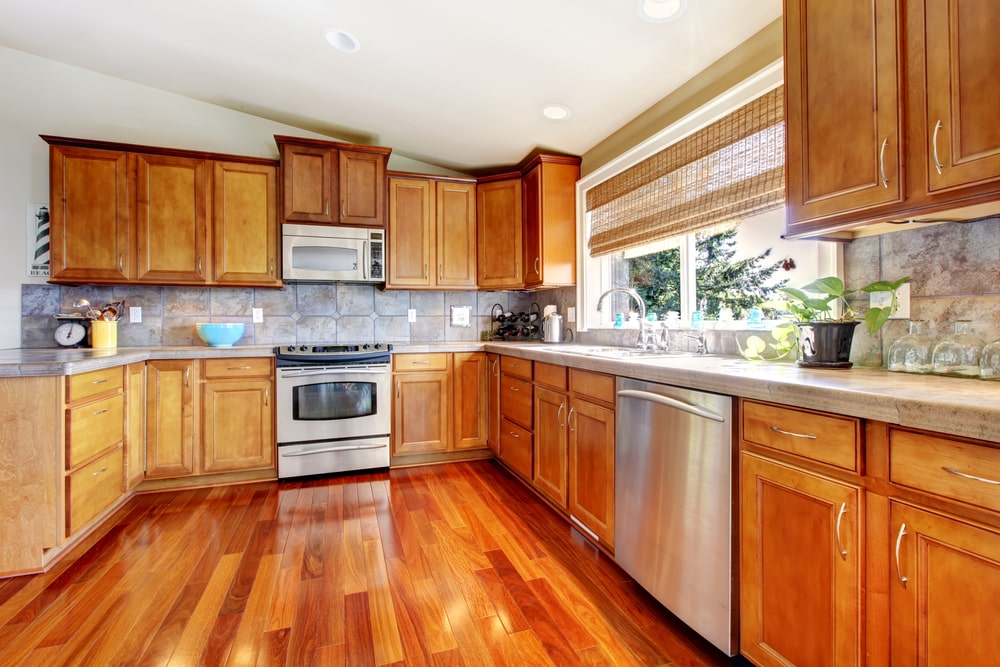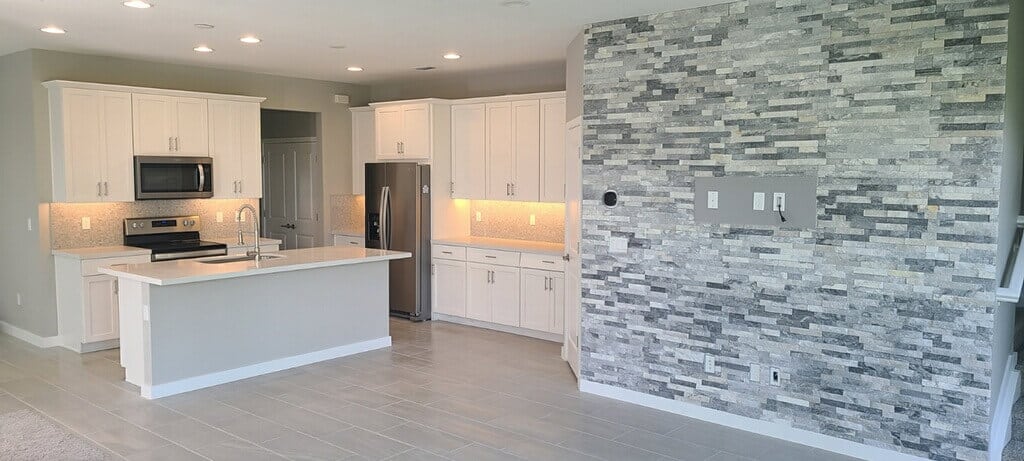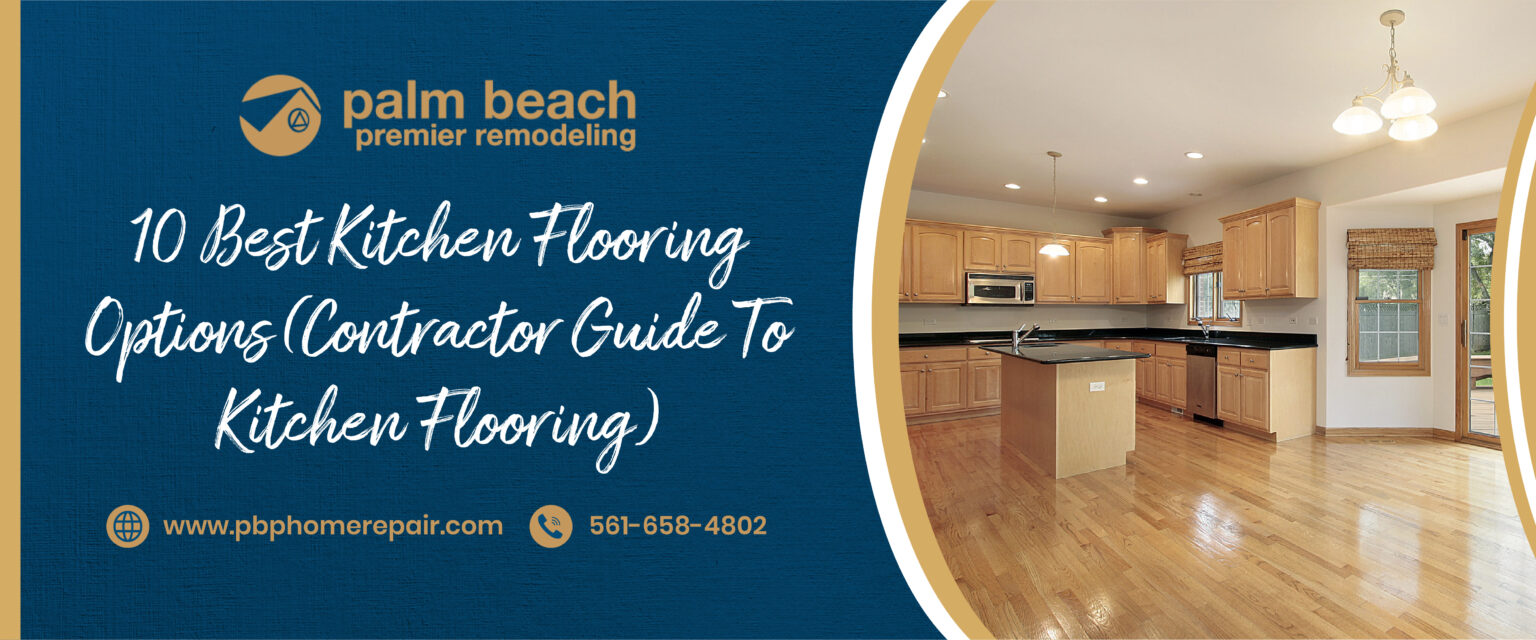Go From Demo To Cooking in Two Weeks!
What to Consider When Choosing Floors for Your Kitchen
Durability – This is an obvious point but you’ll get so many homeowners flop when choosing flooring materials. When it comes to durability, ensure you choose a floor type that can work well under the activity you throw at it. There’s no one size fits all for kitchen floors. So vinyl flooring might be good for one kitchen but not good for another.
Cosmetic Appeal – You want a kitchen floor that matches the rest of your home. One that has looks good but you shouldn’t overlook sturdiness for good looks.
Cost – By the end of the day, you can only install a kitchen floor you can afford. If you can afford and maintain solid hardwood that requires frequent sealing so be it. Another person will afford tiles that are cheaper to install and maintain.
Room Size – Room size plays a role in determining what materials you choose. With big rooms, some clients choose to integrate two flooring materials. Some materials look better than others depending on the size.
Best Durable Options for Kitchen Flooring
Go From Demo To Cooking in Two Weeks!
Porcelain Tiles
There are very few other flooring options that beat porcelain tile when it comes to durability. This makes it a suitable option not just for your kitchen floor but also other home spaces. Porcelain tiles combine style and functionality to make your kitchen floor beautiful, practical, and functional. Even though they are similar to ceramic tiles, porcelain tiles tend to be much more durable and suitable even in commercial kitchens. Simply put, porcelain tile is an improved/upgraded version of ceramic tile.
If you use your kitchen for multiple activities other than preparing meals, say holding family or friends gatherings, you’ll need a sturdy kitchen floor. With porcelain kitchen floors, there’s no cause for worry. These tiles can withstand constant high foot traffic.
Again, porcelain tiles are highly resistant to stains. The tiles are porous and less dense – a feature that makes them resistant to any kind of stain. So you don’t have to worry about permanent stains when you spill anything on your kitchen floor.
Durable – Porcelain tiles are much more durable compared to their counterparts. This explains why they are most preferred and widely used in both residential and commercial kitchens. With it, you won’t be repairing or replacing your kitchen floor any time soon.
Easy maintenance – Another feature that makes porcelain tiles perfect for use in kitchens is the ease of maintenance. Typically, all floor types must be maintained to last long. The only thing that varies is the maintenance demands. Porcelain tiles don’t come with crazy maintenance demands. All you need to do is keep the floor clean with sweeping and mopping. These tiles don’t shelter bacteria as their counterparts do and also absorb less moisture. You only need a rag or a piece of cloth to mop and sweep away the spills and spots on the surface without much struggle.
Although porcelain tile is among the best kitchen flooring options, it has some downfalls. First, you should be ready to break the bank to have them installed in your kitchen. However, compared to the value you get from porcelain tiles, cost shouldn’t be an issue. Another limitation is with the weight. If your kitchen is located upstairs, be ready to break a sweat carrying them to your kitchen. Also, this feature makes it difficult to do the installation work by yourself.
Go From Demo To Cooking in Two Weeks!
Create A Scope Of Work For The Kitchen
Natural Stone Tile
Bring some natural beauty and class in your kitchen with natural stone tiles. This flooring option is your best bet for a durable kitchen floor. You have multiple options to make your kitchen floor elegant and luxurious. Some of the best natural stone tile options for kitchen flooring include; Granite, Limestone, Slate, Marble, and Travertine. Why choose natural stone for your kitchen flooring?
Long-lasting – When it comes to durability, natural stone is a beast. The material is as hard as a rock, and you can tell that from the name ‘stone tile.’ Even when exposed to harsh conditions such as heavy foot traffic, stone tiles will still serve you for an extended period.
Easy cleaning and maintenance – It’s much easier to keep your stone tile kitchen floor looking new and fresh. The surface does not attract dust or allergens, which makes it easier to clean. A simple trick to use is vacuuming, simple sweeping, and dust-mopping, and you’ll be good to go.
Non-slippery – Natural stone is sturdy and provides good traction, so you don’t have to worry about the risks of falling even when it contacts water. Your kids and pets will be safe to use your natural stone kitchen floor.
Natural beauty – The name says it all. Natural stone flooring gives your kitchen floor a natural and elegant appearance that can’t be found in other flooring options. They come in all manner of colors including red, green, browns, and earthy tones. For instance, if you want to create a luxurious kitchen flooring with natural stone tile, go for marble and granite. Again, this kitchen floor is eco-friendly and safe for our planet.
Best of all, stone adds some value to your home, increasing your home’s resale value. Buyers will be willing to purchase a home that depicts natural beauty and is durable.
Since natural stone tiles come in various tiles, you must be certain about the specific type that fits your need. Remember, the various types of natural stone tiles come with different properties with regard to resistance durability, and sturdiness.
If you don’t know the difference between the stone tile options, you should seek help from a professional. Again, you can make the floors more durable by regularly sealing and maintaining them well. If you’re in for high-end luxury, natural stone kitchen flooring is your best option.
Installing stone can be a tough job so make sure you involve renovation experts to do it right.
Fully Transparent Quote Process
Vinyl Kitchen Flooring
If you want something that feels comfortable underfoot, vinyl flooring will be a perfect choice. If you go the vinyl way, you’ll have three options to make as follows.
Vinyl sheets – Sheet vinyl comes in a variety of colors, patterns, and designs to make your kitchen floor eye-catching.
Planks – These resemble hardwood and can mimic exotic species or distressed surfaces. They also have beveled edges.
Vinyl tiles – These take the form of ceramic. You can create different patterns with them.
Why go for Vinyl Flooring?
Durable – The reason most homeowners prefer vinyl flooring material over others for their kitchen flooring is because of the long-lasting feature. If properly installed and well taken care of, vinyl flooring can serve you for a period of 10 to 20 years.
Water and stain-resistant – Vinyl is impervious to moisture penetration which makes it waterproof. This is essential, especially for a very active kitchen prone to spills and leaks from cooking, the refrigerator, or dishwasher. Vinyl planks don’t buckle, swell or lose integrity when exposed to water which makes them ideal for kitchen flooring.
Great designs and comfort – Vinyl flooring comes in various designs and finishes to help you create a beautiful appearance in your kitchen. The materials come in textures resembling leather, slate, and wood to make your kitchen floor more stylish. Vinyl tiles and sheets can mimic ceramic tile, stone, and even wood.
Also, you’ll feel comfortable under feet standing on a vinyl kitchen floor for long hours due to its soft surface. If you drop anything on the floor, say a mug or glass, the objects are less likely to break.
Affordable – Even with the many benefits it offers, vinyl is still the most inexpensive kitchen flooring option in the market today. It’s an ideal solution for those working on a tight budget, plus you can install it yourself. What’s more, the maintenance requirements aren’t high. You just need to clean your floor regularly with a broom or mop.
However, you should avoid cleaning your vinyl kitchen floor using solid detergents, bleaches, or abrasive cleaners. Also, do not use scouring pads during cleaning as they may leave scratches on the material.
The Design Process
Hardwood Flooring
Since kitchens are semi-moist or sporadically moist, they do well with hardwood floors. This type of kitchen flooring is easy to clean and adds value to your home. Although wood isn’t waterproof and water can damage it quickly, it can be modified to last longer while offering some water-resistant features.
Also, when choosing hardwood as your kitchen flooring option, you should consider various factors like the species of the wood. Some species are more solid than others. A good example is an oak. It is also essential to take note of stained and natural colors and pick the one you’re comfortable with.

The Installation and Execution
Types of hardwood flooring
If you’re considering hardwood floors for your kitchen, you need to understand the various types. Below is an overview of the different kinds of hardwood materials you might want to install.
Solid hardwood – This type of wood is more susceptible to moisture. It’s very pure and must be sanded and refinished before use. Also, if you want to use it for your kitchen flooring, remember to coat it with a durable finish to prevent damage due to moisture, wear, and stains.
Engineered hardwood – If you want a more stable and durable wood flooring option, engineered wood should be your best choice. A quality engineered hardwood kitchen floor can last for up to 20 years with proper maintenance. Besides, you can install it yourself to save costs, and it’s a less expensive flooring option.
Engineered wood is made up of multiple layers of plywoods bonded and clinched together with a plank of solid wood. This makes the material sturdy and more durable compared to solid hardwood. It can withstand constant heavy footfalls, which makes it ideal for kitchen use. The material is also stylish and adds value to your home while increasing its resale value.
Care and maintenance
Despite being among the best and most durable kitchen flooring options, hardwood floors have demanding maintenance requirements, and this is what determines their longevity.
Always ensure that there’s no dirt or grit on your hardwood kitchen floor by vacuuming or sweeping it regularly. Wipe any spills immediately and never leave stagnated water on your floor for an extended period as this would damage the hardwood floor.
And since wood is not moisture friendly, you should avoid wetting the floor and only mop it occasionally using a dampened towel or mop. If you notice any damages or worn-outs on your hardwood kitchen floor, you should address them as soon as possible.
Linoleum Kitchen Flooring
If you’re looking for a resilient flooring material with some cushioning effects, try linoleum flooring. This flooring material has all the characteristics needed for a durable kitchen floor.
Linoleum has no environmental drawbacks. It is naturally made from biodegradable and renewable materials like cork, wood flour, and linseed oil, which gives it its resilience and bounce features.
Durable – Linoleum is one of the most durable flooring materials in the market today. With proper maintenance, this flooring material can last for up to 40 years or even more. What’s more, linoleum flooring materials usually come with warranties of up to 25 years.
A little maintenance is required to keep your linoleum kitchen floor fresh and elegant for a long period, usually occasional sweeping and damp mopping.
Eco-friendly – Linoleum is made of biodegradable and renewable materials like wood flour, linseed oil, and cork, which doesn’t pollute landfills. Besides, the material doesn’t produce any harmful fumes when burnt, unlike vinyl.
Less visible scratches – It’s rare to spot scratches and gouges on the surface of linoleum floor because it is made up of solid material. This flooring material maintains its glossy look throughout its life span.
Inexpensive – Linoleum is a relatively affordable kitchen flooring option compared to other materials. Also, considering its longevity, the cost of installing and maintaining linoleum floors is worth it.

Hire Professionals to Renovate Your Kitchen; Palm Beach Premier Remodeling
Whether you’re installing a new floor in your kitchen or replacing an old one, there are many durable flooring options you can choose from. As you make your choice consider the pros and cons of each of the materials. Determine how durable, stain-resistant, waterproof, and easy to maintain they are before picking one. When you find what’s suitable for you, get a professional kitchen remodeling professional to help you do the installation. That way, you’ll be sure your floor will serve many years and still remain in a good condition.

